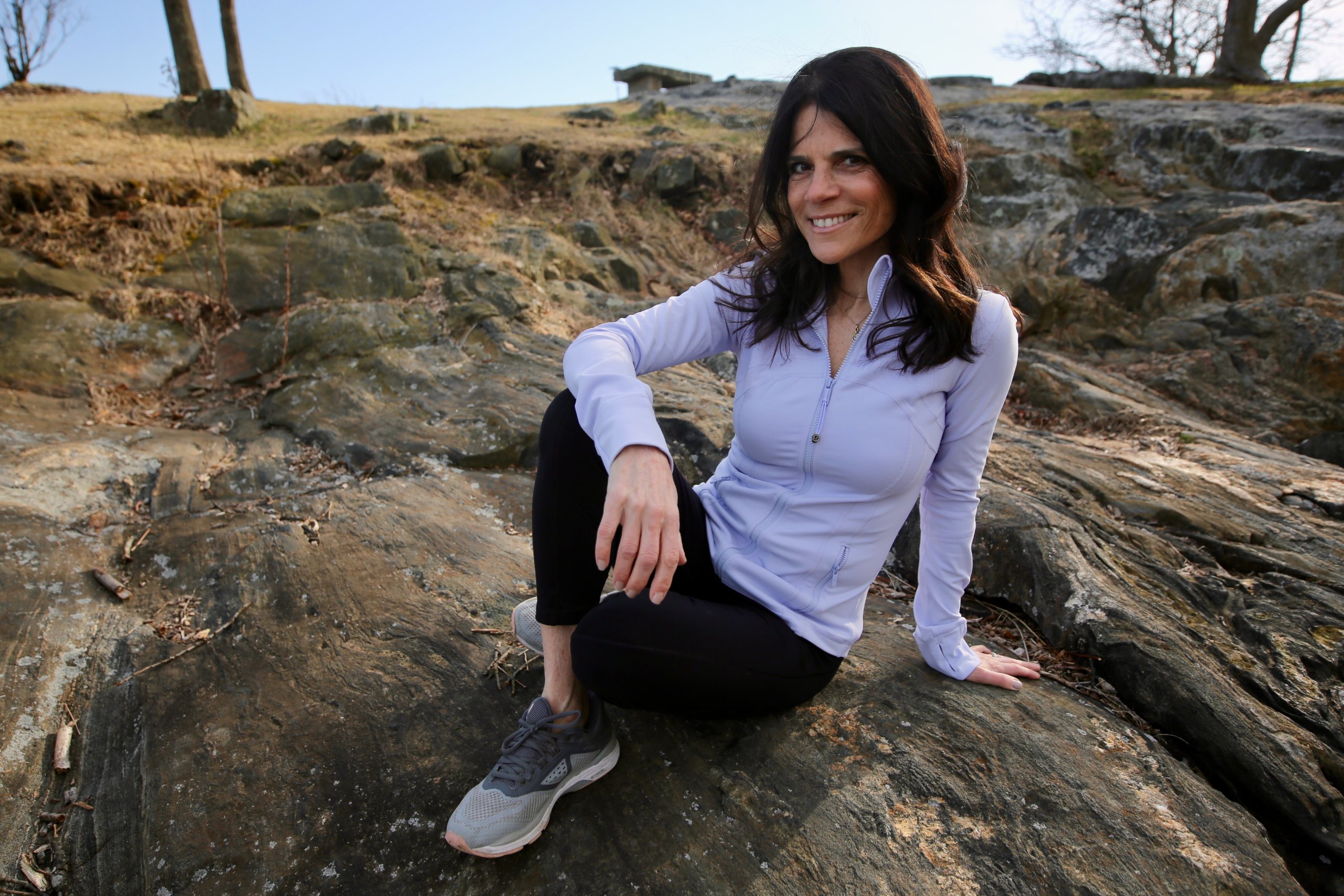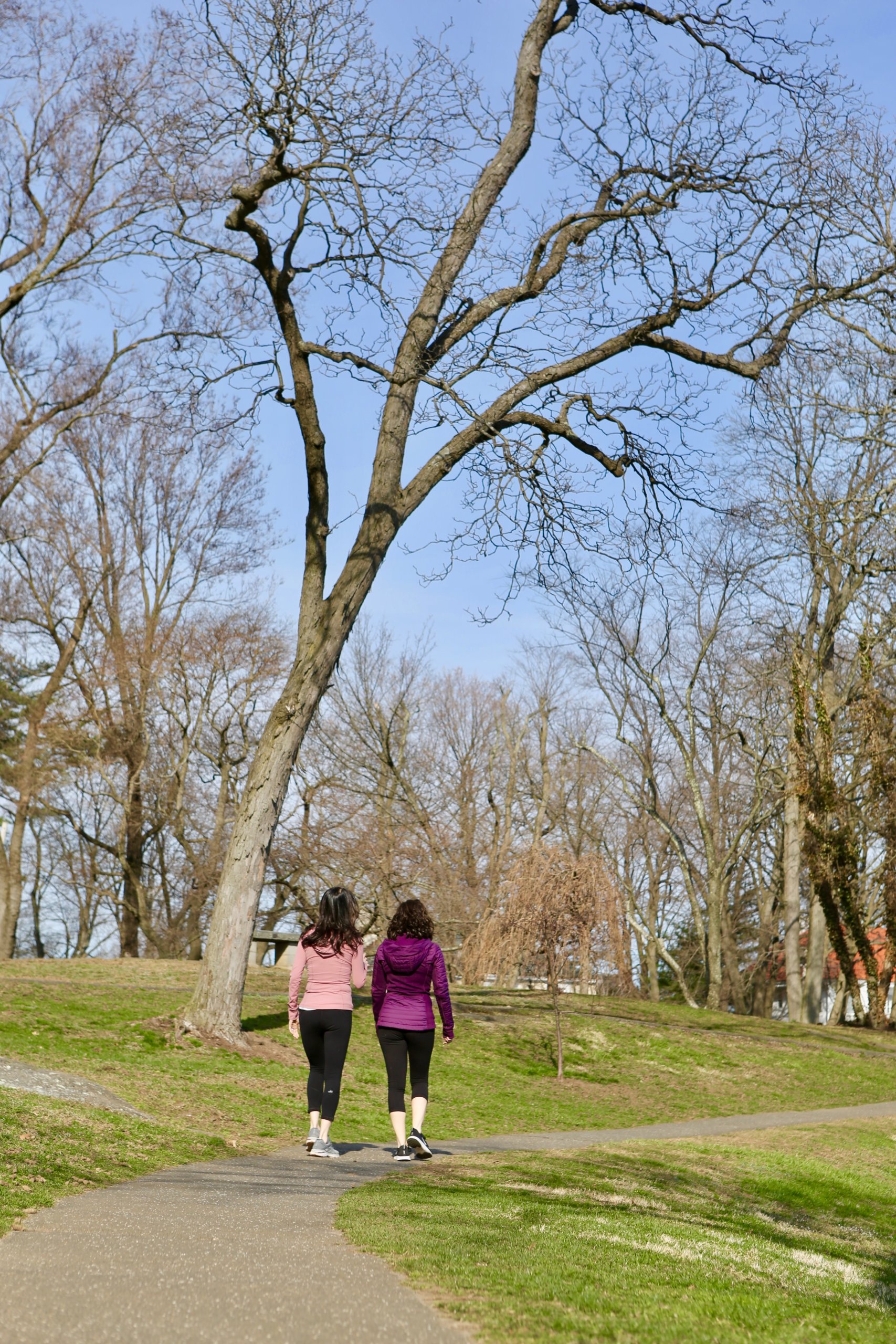Navigating the Hamptons Season with Pace of Mind

Founded two years ago this month, Pace of Mind Therapy offers an innovative approach to therapy, incorporating exercise and nature into each session as founder Tracy Nathanson, LCSW walks and talks with clients individually or in groups (prior to the pandemic). As the East End readies for what will likely be a busy, social Hamptons summer season, we spoke to Nathanson about the vital service she provides, the benefits of walk and talk therapy and how to mentally prepare for our return to a re-opened East End.
What does a Pace of Mind session look like as the East End re-opens?
We’re still walking and talking together, and we’re still at least six to nine feet apart. Now, the discussion in the post-pandemic world—the first thing would be about vaccination. I’m double vaccinated, so if my patient is double vaccinated or vaccinated and the patient is comfortable, then we’re not wearing masks. The mask question was always the first question as I’ve been walking during the pandemic prior to vaccines, as we were walking, we would always wear a mask without a doubt, but now that there are some options and that more and more of us are getting vaccinated, we do discuss the option of not wearing mask. But I want to make sure that the patient is comfortable with that.
What are some popular Hamptons spots for Pace of Mind walk and talk sessions?
The beach walk and talks are very popular, and we offer them anywhere from Southampton to Amagansett, any of the beaches. I really try to meet my clients at the beach that’s most convenient for them, and there’s also this metaphor, “I meet them where they” both literally and physically. I meet them where they are at the beach, and I meet them where they are in their life… It’s good exercise, but it’s not a competition…we’re walking together, navigating their path, their journey on this road together.
If they don’t want to go to the beach, we’ll meet in their neighborhood. I’ve walked around the neighborhood with a patient who had a newborn, a baby. I’ve done that, because sometimes for new mothers, it’s very hard to get out, and walk and talk therapy can be really helpful for them because they can feel very isolated, especially in those first few months.
Have you found clients to be generally more open and forthcoming in an outdoor public setting versus a private office?
Some clients report that being outdoors and moving really helps them feel more open to talking, and it can be easier to build that therapist-client rapport and that relationship because they feel more comfortable. We’re not facing each other in the office, we’re walking together side by side, so they feel comfortable like that.

With therapy, exercise and fresh air proven to be beneficial to mental/emotional wellbeing individually, is the positive effect amplified beyond the sum of its parts when combined?
All three of these together [talk therapy, exercise and being outdoors] improve your self-esteem, reduce depression and anxiety, are good for stress relief, help with sleep, boost immunity with vitamin D. You’re really getting this combination of several helpful effects—emotionally, physically, mentally, physiologically. We do want to see more research, but what we do see does shows the effectiveness of all these things together.
What are some specific aspects of therapy that Pace of Mind is working to destigmatize?
Of the more well-know stereotypes around therapy, let’s say number one is that you’re weak—that depression can be seen as a sign of weakness or that you’re not a strong person, you can’t handle this alone, you need help, there’s something wrong with you if you need therapy. If you really think about walk and talk therapy, it’s really kind of strength building. If you think about building your muscles and you’re getting out there and walking together with someone, you’re really not alone.
When we talk about the stereotypes, particularly with men, research shows that men are less likely to seek therapy, to report their symptoms, to report their problems. For men, it can be particularly helpful to do this type of walk and talk therapy—getting out there and talking, feeling less threatened, less inhibited.
What are the biggest concerns your clients are sharing regarding the East End re-opening?
The anxiety that I’m seeing post-pandemic is really around personal comfort levels of socializing with others. There’s a bit more self-awareness and self-consciousness about re-entering society and navigating that for themselves and for their family members—feeling very anxious about exactly what it looks like and what those expectations are going to be for them personally. And then professionally, a lot of it is around scheduling routines, what they’ve been comfortable in during the pandemic… They set up their own routines that work for them and have been in control of their schedules. Now, they don’t know what those schedules are going to look like, and there’s a very tentative feeling of ‘How am I going to re-integrate? What is that going look like?’ So there’s concern around that, and I always talk about the safety concern about other people—what are other people going to be like? Is it going to be safe for me to be around them?
There are still a lot of unknowns. So they’re dealing with the anxiety of the unknown…the loss of their predictability, their freedom, loss of family members, some have had COVID, so they’re navigating that, too. We’re talking about a lot of this stuff, so we’re processing these feelings, processing these emotions, discussing coping skills and how we’re going to address these feelings…so the post-pandemic walk and talk is really about processing together, utilizing coping skills that may have worked before but now we may have to adapt in this post-pandemic environment.
What advice can you offer those nervous about the reopening of society and the upcoming Hamptons season?
The first thing I like to say is that we need to normalize these feelings; it’s very understandable and normal to feel this way. It’s been a year like we’ve never had. We’ve been in isolation and haven’t interacted much with others. We haven’t used that muscle a lot, and it’s kind of atrophied a bit.
The second thing is to identify what exactly about the Hamptons season, the upcoming summer, is worrying you. Is it a particular person in general, or being around a lot of people? I think if you’re able to take some mental notes and understand what is making you feel stressed and anxious.
The third thing I’d say is utilize your coping skills, and sometimes we have to develop coping skills to deal with this, and they may be different than skills that you’ve used before… I like to use this term a lot, especially when I’m walking with clients, the active reframe, because that’s also a metaphor for walk and talk therapy. We’re reframing things on the go, so let’s think about the situation a little differently… If you start getting stressed out thinking about it, do some breathing, do some meditation, go out and take a walk, or do a walk and talk session with someone. Really try to keep yourself as present as you can, because when we worry about the future, the anticipatory anxiety can sometimes be greater than the actual event that that’s happening—a lot of times it is.
The last thing I will say is that the communication is really important. It may be different now with your friends and with people, navigating that communication around activities and the social season—being honest and transparent if you can, being an active listener trying to listen to your friends and others and get a sense of what they’ve been through, not being judgmental, and being patient. In terms of navigating the Hamptons season, really put some of these tools into play when dealing with yourself and dealing with others—try to be patient and understand if someone doesn’t want to do something, talk to them about it a little bit, and realize that you’re not alone and try to validate and support each other through this season. If it feels too uncomfortable to go to a big party, then that’s fine; you have to be where you’re at and express that to your friends and navigate that. Knowing that you have strategies is very important!
Visit paceofmindtherapy.com to learn more.









